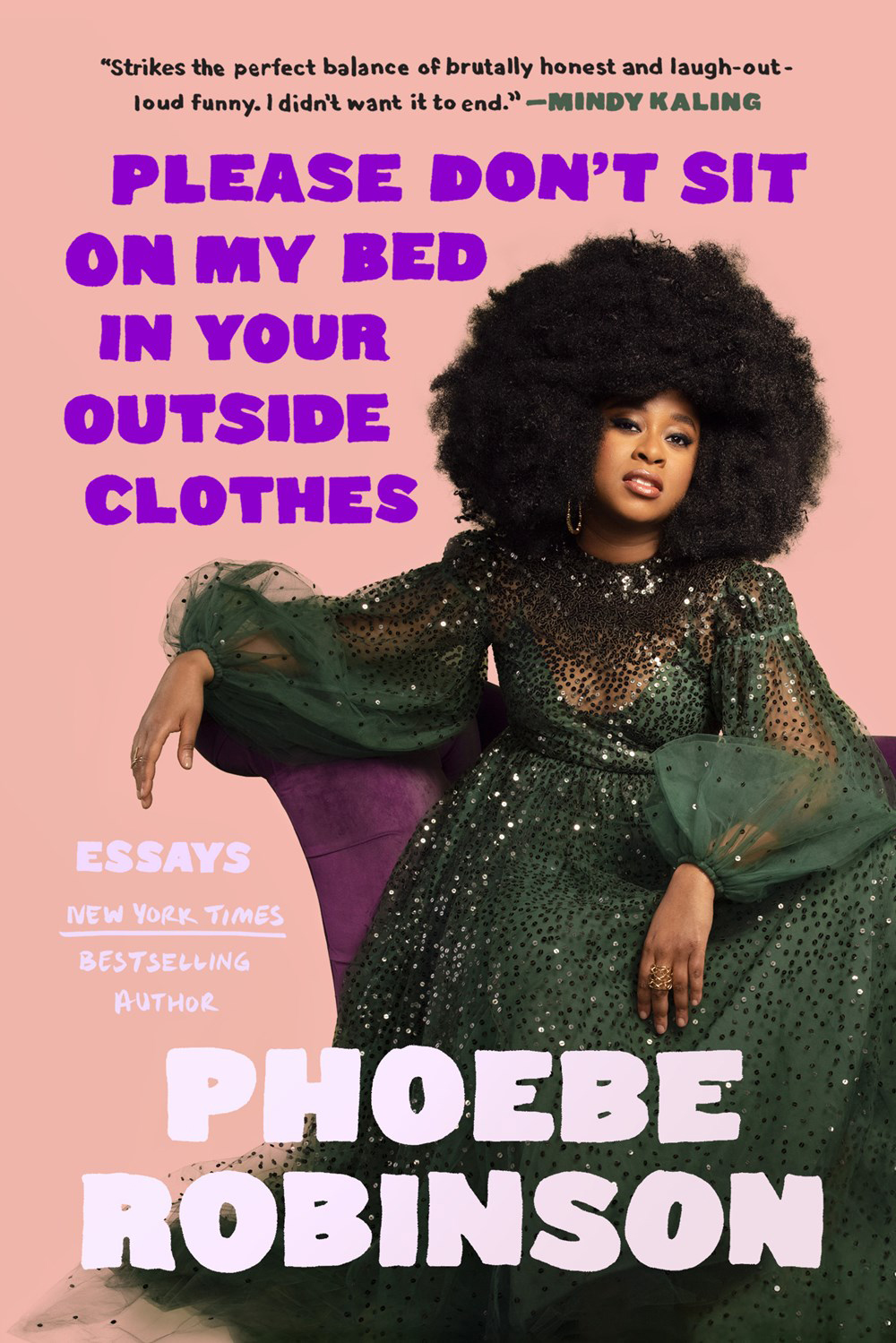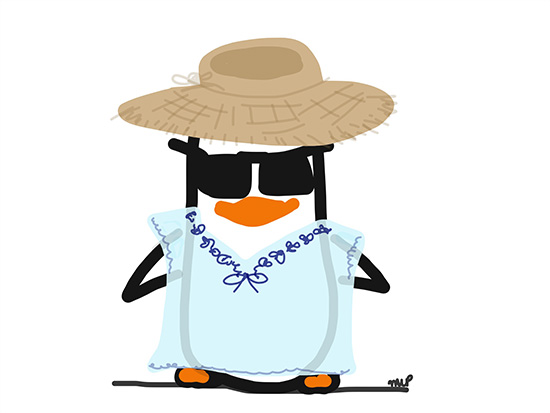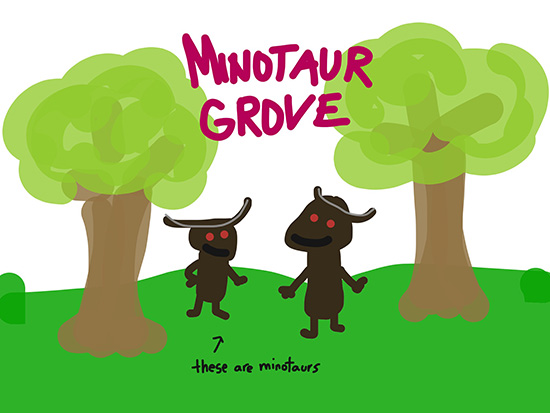In her third book, Please Don’t Sit on My Bed in Your Outside Clothes, Phoebe Robinson is as hilarious, smart and honest as ever. She’s taking action, too, with a new publishing imprint called Tiny Reparations Books.
Congratulations on your latest accomplishments—jewels in your queenly crown!—including your third book in five years. Did you always want to be an author? What about it has been the most surprising, exciting or bizarre?
Thank you so much! I definitely didn’t always want to be an author, which is surprising considering how much I love books and how I used to write stories as a kid. I kind of dabbled in artistic things. Like, I used to draw a lot as a kid and was obsessed with movies and TV shows, so my dream was to write dramatic screenplays that would go on to win Oscars. Very different track that I’m on now—haha—but I’m so happy. I’m right where I’m supposed to be.
What has been most surprising is seeing how much my writing improves book to book. It’s a great way to see what I’ve learned consciously and subconsciously being revealed through my work. Most exciting would have to be when I made the New York Times bestsellers list for You Can’t Touch My Hair. That was my first book, and a lot of effort went into spreading the word about YCTMH, so I’m glad we achieved that goal. And for most bizarre, it would have to be Oprah calling to congratulate me on YCTMH and telling me she enjoyed reading it. Would have never expected that to happen.
For this book, what essay came to you first? What was on your mind that made you feel like it was time to get to work on this collection?
Definitely “Quaranbae.” It was early in quarantine, but I had already started noticing some things both bae and I did that made me laugh or go, “That’s interesting.” Just us being around each other all the time and the ways in which we got in each other’s ways. I just sort of chuckled and wrote a few things down in my Notes app, and then a title popped into my head: Diary of a Bitch in Quarantine. And I thought, “Huh. Maybe this could be a fun essay collection.” I texted my literary agent, Robert, and he said that was cool. So I just started working on a proposal. Then that boneheaded “I Take Responsibility” video came out, and so in addition to writing about personal things, I wanted to write about performative allyship and all that jazz. I truly wasn’t planning on writing a book during quarantine. I think I just needed a creative outlet because so much was unknown. And now we’re here!
“It’s my responsibility to shine a light on people and help make their paths a bit easier than mine has been.”
You do stand-up comedy, podcasts, hosting and acting in addition to writing books. Does one aspect of your multihyphenate career feel most dominant to you, or do you view all of your various jobs as elements of a larger creative whole?
Definitely the latter. I’m just curious about and interested in reflecting many sides of my creativity. And each one nourishes a part of me. I love doing stand-up and getting that immediate feedback from the audience of, “Yes, that is hilarious” or, “Naw, not there yet, but you’re on the right path, so figure it out.” Writing allows me to lean into the side of me that enjoys being alone, where I can be funny or serious. And then all the film and TV stuff is so collaborative, and I enjoy that process of trying to build something that would be impossible for one person to pull off.
The latest additions to the Phoebeverse are a production company and a book imprint, both called Tiny Reparations. What does that name mean to you?
I used to always joke that I’m never going to get the reparations, like the cash, but I can get those small moments of payback from the universe, such as when I met Bono, the lead singer of U2, which is my all-time favorite band. With the production company and imprint, the meaning behind the name expanded from a joke to a reality. It’s been the running theme throughout my career. I’ve always used whatever platform to help uplift other voices and share the wealth. I don’t want to be the token. I don’t want to be the “exceptional one” in a sea of white people in entertainment and publishing. First of all, that is a fallacy. There’s not just one special person of color who is good at this stuff. A whole host of them are, and many of them are ignored, and I don’t want to be the person doing the ignoring. So it’s my responsibility to shine a light on people and help make their paths a bit easier than mine has been. It’s been a wonderful privilege, and I’m always looking for ways to do more. Stay tuned!
“There’s a lot of work to be done to make this industry more inclusive, and I believe we can get there.”
What do you most want to accomplish with Tiny Reparations Books, in terms of its potential to create change in the publishing business?
Without a shadow of a doubt, my goal is to have one of my authors’ books land in the top three on the New York Times bestseller list. Coincidentally, every writer on the slate is a debut author, which is so freaking dope, so it would be nice to be on that journey with them and celebrate them bursting onto the scene in such a cool way. But more importantly, I just want every author to feel supported and like they absolutely got to write the book they wanted to. Writing can be such a torturous and stressful process, and worrying about the book doing well and building a presence on social media can make someone be in their head. I want them to find joy in the process because you never forget the whole journey your first book goes through.
I also really want TRB to help shake things up. To be one of many imprints that are changing the landscape of publishing, both with the kinds of books being published as well as the kinds of people behind the scenes who are gatekeepers, all the way down to interns. There’s a lot of work to be done to make this industry more inclusive, and I believe we can get there. Everyone just has to show up and contribute. It’s not going to magically change overnight because Roxane Gay and I have imprints. The onus shouldn’t be on the two of us to fix everything, ya know?
Will you share a bit with us about the books you’ll be publishing first? 
Yes! I can give you a sneak peek of a couple of them. First up is What the Fireflies Knew. When I read the title to myself, I just imagine Oprah saying it while holding the book and standing in her kale garden. It’s written by Kai Harris, and it’s a coming-of-age story about a preteen girl named KB and her sister who stay with their grandfather for the summer after their father passes away. It’s really moving and powerful and perfectly captures the innocence of youth, sibling relationships and trying to find your place in a world that you don’t quite understand. I love it so much, and I truly believe other people will as well. Kai is the truth!
Then there is Portrait of a Thief by Grace D. Li, who legit wrote this book while in medical school. When I learned that, I was like, “Lol, wut?! I will never complain about writing a book again.” It’s a great heist novel about a group of 20-something Chinese peeps who get hired to steal Chinese artifacts from Western museums. I mean, talk about a hook. Beyond the plot-driven pace, it really sucks you in because there’s so much in there about family and identity and the assumptions we make about what we do and don’t mean to the important people in our lives. I gobbled this up in two days. Grace has a very bright future as an author, and I’m happy she’s on #TeamTinyRepBooks.
You write so movingly about what life was like for you during the height of the COVID-19 pandemic as an individual, as a partner to your significant other (affectionately known as your British Baekoff) and as a Black woman. You write, “If I can make you laugh and forget your problems for a moment then I did something.” Who or what did that for you during 2020?
Great quesh! Tbh, 2020 is kind of a blur. One day just sort of bled into the next, but I will say that I rewatched “Sex and the City,” and that was great. It is such a formative show for me, and Samantha Jones is so freaking funny. It was great to revisit the show and forget the state of the naysh for a bit.
“In my opinion, it’s my best book yet.”
It’s fascinating to read about how your parents have influenced you, whether you find yourself aligning with them (like in your desire to help and support people through your work) or doing things they won’t (like traveling). What was it like for you, plumbing your relationship with them? What was their reaction to the book?
I always enjoy writing about them because they are so different from me and funny in their own unique ways. They haven’t read the book yet. I didn’t want to give them an Advanced Reader Copy just because I didn’t want them to read the book when it wasn’t perfect. But they adorably preordered the book, so I’m sure I will hear soon how they feel about it. I think they will dig it. In my opinion, it’s my best book yet.
You got your passport in 2015 and have been broadening your horizons ever since, as per your “Black Girl, Will Travel” essay. What do you think is a good destination for a travel newbie? Where are you going to travel next?
I’m probably biased because my boyfriend is from the U.K., but I always tell people that London is great to visit. It’s similar to New York in a lot of ways, but also wildly different. There’s so much to do and lots of good food options, and because you can do a daytrip to Bath or take a train to Paris, it’s a place you can return to often and still discover new things.
I miss travel so much! I really want to go to Spain. That’s been on my list for several years, and I just couldn’t make it work. So I’m going to get my shit together and just do it once it’s truly safe to be traveling internationally.
ALSO IN BOOKPAGE: Read our review of Please Don’t Sit on My Bed in Your Outside Clothes.
In the hilarious titular essay, you note with indignation that, despite everyone proclaiming undying love for Mr. Rogers, most of them have missed the memo about the value of having separate outside and inside clothes. This prompted you to share “Phoebe-isms,” about which you feel Very Strongly. Are there any that didn’t make it into the book that you feel compelled to share now?
Surprisingly, I got everything off my chest. But I guess, I will say, “Wash your fucking legs!” When people on social media were talking about how they don’t wash their legs because the soap just drips down anyway in the shower, I almost vomited. That is nasty as hell. The shower isn’t a place to be taking shortcuts or phoning it in.
Once they’ve finished reading your book, where can your fans find you next—from on a stage, to on their bookshelves, to in their earbuds, to on their screens?
My HBO Max stand-up special will be premiering later this year, so be on the lookout for that and stream it! I wanna make a good impresh with the HBO Max folks, so I can do another special with them!
Author photo credit: Yavez Anthonio



























